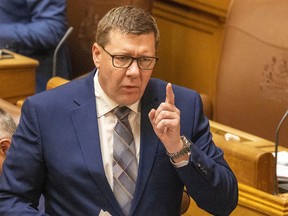A headline in the April 8 edition of the Regina Leader Post reads: “Province sees 4,300 fewer jobs, rising unemployment.”
Economy
Letters: Moe’s ‘scorching hot’ economy is mostly a lot of hot air
|
|
‘The tens of thousands who left Saskatchewan no doubt did so to escape our economy’s scorching heat,’ writes Nial Kuyek.

The Saskatchewan Party government’s 2023-24 Budget carries the bold title: “Growth That Works For Everyone.” This alleged growth clearly hasn’t filtered down to most Saskatchewan families.
An Angus Reid poll released April 6 revealed that 51 per cent of Saskatchewan respondents said they were in either “bad” or “terrible” financial shape. That is the highest figure among all provinces.
Angus Reid also found out 79 per cent of Saskatchewan respondents have cut back on discretionary spending — again the highest rate in Canada. Fifty-five per cent have delayed making a major purchase (e.g. house, car), highest in Canada.
If Saskatchewan’s economy is scorching hot, one shudders to think how families will cope when it is performing poorly.
People are leaving Saskatchewan in droves in recent years. Statistics Canada shows interprovincial out-migration as follows: 7,829 in 2021-22, 7,174 in 2020-21, and 11,412 in 2019-20.
Interprovincial out-migration has exceeded in-migration for the past nine years. The tens of thousands who left Saskatchewan no doubt did so to escape our economy’s scorching heat.
Moe should spare us his flaming rhetoric and focus on getting Saskatchewan back on track.
Nial Kuyek, Regina
Poilievre and his fatal flaws
Federal Conservative Party leader Pierre Poilievre’s fatal flaw is that he simply can’t resist shifting his pronouncements from the obvious to the ridiculous.
The latest example is his urge to see the social media platform Twitter add a “government-funded media” tag to CBC news accounts, as it has similarly done with other public broadcasters in Britain, Australia and the U.S. (where there is National Public Radio).
But after stating that this “transparency” is important because “Canadians deserve the facts,” he can’t help but declare that this would “officially expose” the CBC as “Trudeau propaganda, not news.”
This is also why these voters will also work to see that Poilievre never becomes prime minister. If Poilievre wants to target “government-funded” institutions and programs as illegitimate, voters should also be wary of any future fever dreams about defunding government-funded public services like health care and education in favour of commercially run private for-profit enterprises.
Mervyn Norton, Regina
Trudeau’s Jamaican holiday a problem
Justin Trudeau and his family spent the holiday season at a luxurious estate in Jamaica belonging to a wealthy family that made a large donation two years ago to the Pierre Elliott Trudeau Foundation.
Someone out there, who truly believes in the ideals of the Liberal Party of Canada, should buy Mr. Trudeau a dictionary and highlight the definitions of words such as appalling, disgraceful, inexcusable, disgusting, unscrupulous, reprehensible, despicable, deceitful, hypocritical, sleazy, disingenuous, unprincipled, arrogant, pompous, condescending, egocentric and unethical.
Pierre Poilievre’s attack-dog polices and America-styled vitriolic criticism makes it difficult to support the current Conservative Party.
Lloyd Atkins, Vernon, B.C.





Economy
IMF Boss Says 'All Eyes' on US Amid Risks to Global Economy – Financial Post
The head of the International Monetary Fund warned the US that the global economy is closely watching interest rates and industrial policies given the potential spillovers from the world’s biggest economy and reserve currency.


Article content
(Bloomberg) — The head of the International Monetary Fund warned the US that the global economy is closely watching interest rates and industrial policies given the potential spillovers from the world’s biggest economy and reserve currency.
“All eyes are on the US,” Kristalina Georgieva said in an interview on Bloomberg’s Surveillance on Thursday.
Article content
The two biggest issues, she said, are “what is going to happen with inflation and interest rates” and “how is the US going to navigate this world of more intrusive government policies.”
Advertisement 2
Article content
The sustained strength of the US dollar is “concerning” for other currencies, particularly the lack of clarity on how long that may last.
“That’s what I hear from countries,” said the leader of the fund, which has about 190 members. “How long will the Fed be stuck with higher interest rates?”
Georgieva was speaking on the sidelines of the IMF and World Bank’s spring meetings in Washington, where policymakers have been debating the impacts of Washington and Beijing’s policies and their geopolitical rivalry.
Read More: A Resilient Global Economy Masks Growing Debt and Inequality
Georgieva said the IMF is optimistic that the conditions will be right for the Federal Reserve to start cutting rates this year.
“The Fed is not yet prepared, and rightly so, to cut,” she said. “How fast? I don’t think we should gear up for a rapid decline in interest rates.”
The IMF chief also repeated her concerns about China devoting too much capital and labor toward export-oriented manufacturing, causing other countries, including the US, to retaliate with protectionist policies.
China Overcapacity
Advertisement 3
Article content
“If China builds overcapacity and pushes exports that create reciprocity of action, then we are in a world of more fragmentation not less, and that ultimately is not good for China,” Georgieva said.
“What I want to see China doing is get serious about reforms, get serious about demand and consumption,” she added.
A number of countries have recently criticized China for what they see as excessive state subsidies for manufacturers, particularly in clean energy sectors, that might flood global markets with cheap goods and threaten competing firms.
US Treasury Secretary Janet Yellen hammered at the theme during a recent trip to China, repeatedly calling on Beijing to shift its economic policy toward stimulating domestic demand.
Chinese officials have acknowledged the risk of overcapacity in some areas, but have largely portrayed the criticism as overblown and hypocritical, coming from countries that are also ramping up clean energy subsidies.
(Updates with additional Georgieva comments from eighth paragraph.)
Article content
Economy
Poland has EU's second highest emissions in relation to size of economy – Notes From Poland
[unable to retrieve full-text content]
Poland has EU’s second highest emissions in relation to size of economy Notes From Poland





Source link
Economy
IMF's Georgieva warns "there's plenty to worry about'' in world economy — including inflation, debt – Yahoo Canada Finance

WASHINGTON (AP) — The head of the International Monetary Fund said Thursday that the world economy has proven surprisingly resilient in the face of higher interest rates and the shock of war in Ukraine and Gaza, but “there is plenty to worry about,” including stubborn inflation and rising levels of government debt.
“ Inflation is down but not gone,” Kristalina Georgieva told reporters at the spring meeting of the IMF and its sister organization, the World Bank. In the United States, she said, “the flipside” of unexpectedly strong economic growth is that it ”taking longer than expected” to bring inflation down.
Georgieva also warned that government debts are growing around the world. Last year, they ticked up to 93% of global economic output — up from 84% in 2019 before the response to the COVID-19 pandemic pushed governments to spend more to provide healthcare and economic assistance. She urged countries to more efficiently collect taxes and spend public money. “In a world where the crises keep coming, countries must urgently build fiscal resilience to be prepared for the next shock,” she said.
On Tuesday, the IMF said it expects to the global economy to grow 3.2% this year, a modest upgrade from the forecast it made in January and unchanged from 2023. It also expects a third straight year of 3.2% growth in 2025.
ADVERTISEMENT
The world economy has proven unexpectedly sturdy, but it remains weak by historical standards: Global growth averaged 3.8% from 2000 to 2019.
One reason for sluggish global growth, Georgieva said, is disappointing improvement in productivity. She said that countries had not found ways to most efficiently match workers and technology and that years of low interest rates — that only ended after inflation picked up in 2021 — had allowed “firms that were not competitive to stay afloat.”
She also cited in many countries an aging “labor force that doesn’t bring the dynamism” needed for faster economic growth.
The United States has been an exception to the weak productivity gains over the past year. Compared to Europe, Georgieva said, America makes it easier for businesses to bring innovations to the marketplace and has lower energy costs.
She said countries could help their economies by slashing bureaucratic red tape and getting more women into the job market.
Paul Wiseman, The Associated Press
-



 Science9 hours ago
Science9 hours agoJeremy Hansen – The Canadian Encyclopedia
-



 Investment9 hours ago
Investment9 hours agoUK Mulls New Curbs on Outbound Investment Over Security Risks – BNN Bloomberg
-



 Tech8 hours ago
Tech8 hours agoSave $700 Off This 4K Projector at Amazon While You Still Can – CNET
-



 Tech7 hours ago
Tech7 hours ago'Kingdom Come: Deliverance II' Revealed In Epic New Trailer And It Looks Incredible – Forbes
-



 Sports7 hours ago
Sports7 hours agoAuston Matthews denied 70th goal as depleted Leafs lose last regular-season game – Toronto Sun
-
Real eState8 hours ago
Sick of Your Blue State? These Real Estate Agents Have Just the Place for You. – The New York Times
-



 Health23 hours ago
Health23 hours agoSupervised consumption sites urgently needed, says study – Sudbury.com
-
News22 hours ago
Canada's 2024 budget announces 'halal mortgages'. Here's what to know – National Post




Comments